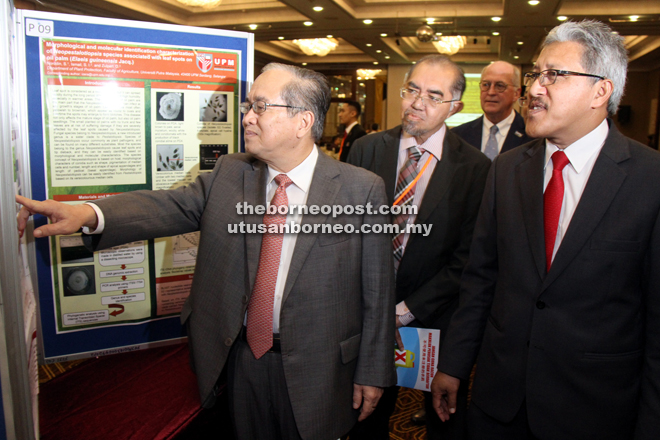
Uggah goes through some of the exhibits on display during the 9th ICPPT as Hafidzi (centre) and Abdul Shukor (right) look on. — Photo by Chimon Upon
KUCHING: The government will reinforce its already strict quarantine measures in all the state’s 17 entry points to monitor international agriculture trade movement and to prevent entry of invasive pests and diseases.
In addition, several known entry points such as Serikin, Lachau and a remote area in Ulu Baram will also need to be gazetted to facilitate agricultural trade between neighbouring Kalimantan and Sarawak, Deputy Chief Minister Datuk Amar Douglas Uggah Embas said.
The Minister of Modernisation of Agriculture and Rural Economy also stressed on the need to upgrade the capacity and capability of plant inspectors, as well as screening and quarantine facilities at the entry points.
He said over the past two years, about 82 agriculture products found with diseases have been intercepted.
The state regulates its strict agriculture trade movements under the Plant Quarantine Act 1976 and the Plant Quarantine Regulation 1981. Imported consignments are screened visually for the presence of pests.
“The government is taking a serious view on this. We have to make sure that whatever agriculture products and crops imported to Sarawak must go through the quarantine facilities to be checked for diseases.
“The state needs to strengthen its quarantine point to ensure adequate facilities are in place to monitor entry of agriculture products and ensure it remains free of diseases,” he told a press conference after officiating at the 9th International Conference on Plant Protection in the Tropics (ICPPT) at Hilton Hotel here yesterday.
Also present were the Malaysian Plant Protection Society (MAPPS) president Prof Dr Abdul Shukor Juraimi and organising chairman Assoc Prof Dr Hafidzi Mohd Noor.
At the same time, Uggah appealed for public cooperation to ensure that no fruit products from countries with records of plant diseases are imported.
In his speech earlier, the minister said globalisation and free trade between countries had made plant quarantine more important.
He admitted to limitations in preventing the entry of invasive pests and diseases, saying the state’s 1,107-mile long border with Indonesia presented a major challenge.
In Malaysia, incursions include moko and blood diseases of banana, Erwinia dieback of papaya, Erwinia stem canker of dragon fruit, citrus greening disease (CGD) of mandarin oranges and red palm weevil which have seriously impacted the crop industry.
In the case of dragon fruit, CGD and bacterial diseases have virtually destroyed the once lucrative industry.
“So far, Sarawak is free from the two bacterial diseases of banana and Erwinia dieback of papaya. We are taking all precautionary measures to protect our ‘clean’ status. The measures taken by the state government are to promote the use of clean banana meristem culture planting material and to discourage the use of papaya seeds from disease infected areas.
“Furthermore, the threats of mango seed weevil, red palm weevil and the noxious Mexico weed (Parthenium hysterophorus) are always there to watch out for,” he continued.
On a related note, Uggah reminded that greater emphasis on international trade in agriculture commodities, and to avoid trade barriers, local produce must meet the specific plant quarantine and food safety requirements of the importing countries.
In this regard, his ministry together with the state Agriculture Department have placed great emphasis on the judicious use of pesticides to ensure produced food are safe from pesticide contamination.
The department has also implemented the myGAP (Malaysian Good Agricultural Practice) certification scheme to ensure that farms comply with good agricultural practices and that the entire produce meet the pesticide residue permissible levels stipulated under the Food Act 1983.
“These proactive approaches have enabled Sarawak to record the lowest pesticide residue violation rate of 2.6 per cent in 2015,” Uggah continued.
Themed ‘Healthy Crops for a Healthy World’ the three-day biannual event ends tomorrow. The conference gathers about 150 delegates from 13 countries.
